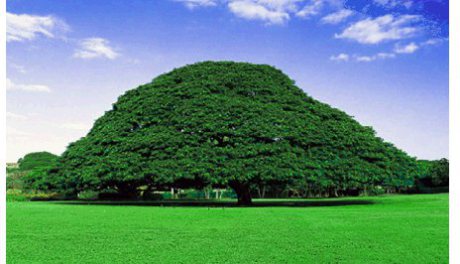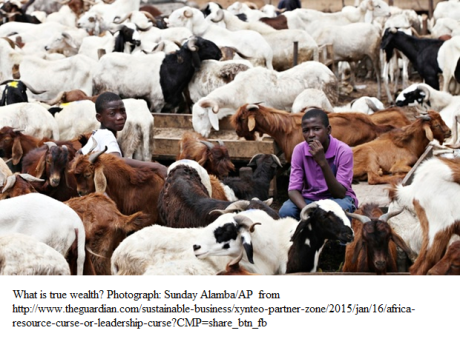Africa: resource curse or leadership curse? January 17, 2015
Posted by OromianEconomist in Africa, Africa Rising, Corruption in Africa, Dictatorship, Illicit financial outflows from Ethiopia, Leadership curse.Tags: Africa, African Studies, Developing country, leadership curse, State and Development, Sub-Saharan Africa, The Tyranny of Ethiopia, Tyranny
trackback
The main challenge for Africa is to reinvent how it grows, in a way that creates opportunities for all. The opportunity to go to a good hospital; the opportunity to attend a competent school and develop technical and intellectual skills; the opportunity of not being discriminated against based on gender; or simply the opportunity to produce a couple more litres of milk and become an abundant farmer instead of a subsistence farmer. The key is having the possibility of living like Malik wanted to, by trading and sharing his goats and vegetables, or choosing a more “westernized” lifestyle.
In order to shape this new kind of growth and reverse this leadership curse, it is fundamental to reinvent leadership itself.
Africa’s “eternal” incumbent leaders – such as Equatorial Guinea’s president, Obiang; his Uganda congener, Museveni; or Cameroon’s head, Biya – have not steered the wheel in the direction of generalised prosperity. They have instead narrowed the chances for anyone else to achieve it.
Africa needs leaders from different disciplines, places and generations, who are capable of challenging the status quo and framing a new development phase. And the importance of involving both policy and business is large. The curse can only be lifted if government, civil society and business leaders collaborate to craft long-term strategies for their countries and people.
In a nutshell, there is a need to develop African leaders who are capable of acting differently. Leaders who not only have a broad understanding of the contextual world but also have an in-depth knowledge and respect for local behaviour. Leaders who are capable of composing a better future by going beyond the golden GDP growth quest or revenues pursuit; and who instead value their ecosystems as a whole: their existing human and natural resources. Leaders who Malik would be proud to go home to.
The big question remains: is Africa ready to overcome these barriers?
Xyntéo analyst Joao Sousa blogs on an encounter that made him reflect on what the golden GDP quest means for the people of Africa
Joao Sousa, The Guardian
A few weeks ago, on one of my regularly-occurring train rides to Oslo airport, I sat next to someone who would make me rethink the way I perceive the world. This man was a 40-something Somalian who had been living in Oslo for longer than he wanted. I greeted him and he greeted me back, telling me his name was Malik and that he was from Jilib, in Somalia.
I have always been curious about life in Somalia, and wondered whether the Somali novelist Nuruddin Farah’s books convey the media-blurred reality of the place.
So I asked him what it was like in Somalia. “Very good,” he said, “in Somalia we would be very rich if it were not for the war.”
I wondered what he could be talking about, considering Somalia isn’t known for riches and resources. He then showed up humans’ differing perceptions of “wealth” by saying, “We have lots of goats and we even grow our own vegetables.” Wealth, to Malik, is evidently very different from wealth according to the average westerner.
Knowing the situation in Somalia is now more stable, I asked him whether he had any plans to go back, and he told me, with watering eyes, that one of his remaining dreams is to return home and live from what he can get from the land, with his community.
The same week that I met Malik, newspapers all over the world were full of stories about Nigeria’s “miraculous” GDP recalculation, which saw its numbers double overnight despite “missing billions”. The ordinary Nigerian person, however, stood exactly in the same place as they were the day before.
Nigeria and Somalia are very different sub-Saharan countries. The first, one could say, suffers from the resource curse; the second simply suffers. Nigeria is the largest African oil producer; Somalia has one of the lowest GDP per capita (PPP) in the world, 90 times lower than in Norway.
But in spite of the differences the two countries have many similarities (and, no, I don’t mean Boko Haram and Al Shabaab). Both are highly exposed to climate change, which degrades their land and causes food and water scarcity. Both have dysfunctional educational systems, malfunctioning political arrangements, hindered rules of law, and flawed wealth distribution. (Jim Yong Kim, the World Bank president, was right when he connected all these issues in one sentence: “We will never end poverty if we don’t tackle climate change.”) And both have an enormous untapped natural and human potential that can only be met if their future leaders are visionary and transformative.
Spin the globe, close your eyes and try to point to Africa. The probability is that your finger lands on a country with similar symptoms to Nigeria and Somalia. Look at Angola, with its rocketing growth over the last decade; or the frequently-cited success story of Botswana, with its impressive economic indicators. GDP figures might indicate everything is rosy, but scratch the surface and the symptoms described above – dysfunctional education systems and so on – remain. Oil-rich, gas-rich, tanzanite-rich, just-culturally-rich or not-rich-at-all, many African countries suffer from the same syndromes. This makes me wonder if there is a resource curse or if it is instead a leadership curse.
Africa’s asymmetric and trembling growth has its foundations in models primarily designed by and for developed countries. Moreover, its success is – most times wrongfully – measured by its countries’ GDPs alone, leading to occurrences like the misleading example of Nigeria’s recent GDP recalculation.
Crucially, millions of “Maliks” don’t think GDP is relevant when they think about measuring wealth. By Malik’s measure – having the ability to live among his community and from the land – Africa is perfectly placed to create a new kind of growth, by approaching consumption and wealth in a way that isn’t simply about GDP or revenue and that is, instead, about looking holistically to people’s current and future needs and behaviours.
The main challenge for Africa is to reinvent how it grows, in a way that creates opportunities for all. The opportunity to go to a good hospital; the opportunity to attend a competent school and develop technical and intellectual skills; the opportunity of not being discriminated against based on gender; or simply the opportunity to produce a couple more litres of milk and become an abundant farmer instead of a subsistence farmer. The key is having the possibility of living like Malik wanted to, by trading and sharing his goats and vegetables, or choosing a more “westernized” lifestyle.
In order to shape this new kind of growth and reverse this leadership curse, it is fundamental to reinvent leadership itself.
Africa’s “eternal” incumbent leaders – such as Equatorial Guinea’s president, Obiang; his Uganda congener, Museveni; or Cameroon’s head, Biya – have not steered the wheel in the direction of generalised prosperity. They have instead narrowed the chances for anyone else to achieve it.
Africa needs leaders from different disciplines, places and generations, who are capable of challenging the status quo and framing a new development phase. And the importance of involving both policy and business is large. The curse can only be lifted if government, civil society and business leaders collaborate to craft long-term strategies for their countries and people.
In a nutshell, there is a need to develop African leaders who are capable of acting differently. Leaders who not only have a broad understanding of the contextual world but also have an in-depth knowledge and respect for local behaviour. Leaders who are capable of composing a better future by going beyond the golden GDP growth quest or revenues pursuit; and who instead value their ecosystems as a whole: their existing human and natural resources. Leaders who Malik would be proud to go home to.
The big question remains: is Africa ready to overcome these barriers?


Reblogged this on ramoursnet.